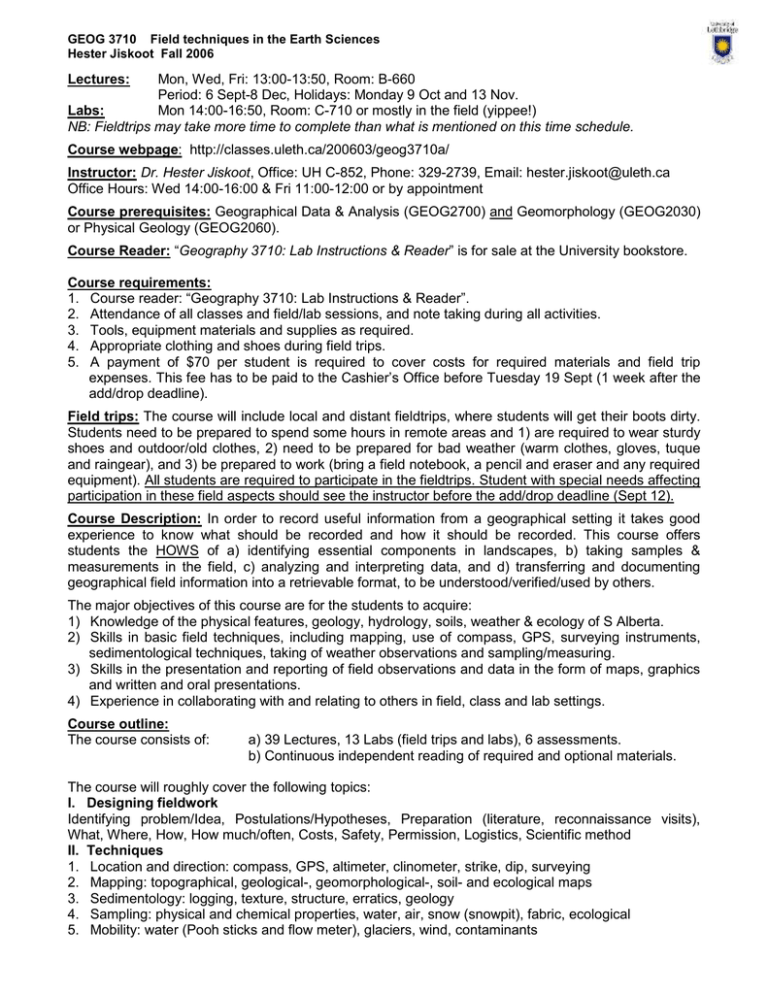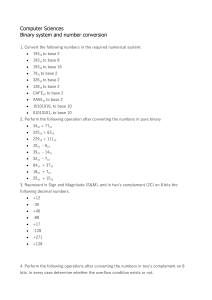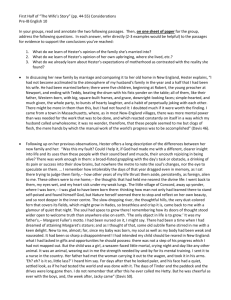Lectures: Labs: Mon, Wed, Fri: 13:00-13:50, Room: B-660
advertisement

GEOG 3710 Field techniques in the Earth Sciences Hester Jiskoot Fall 2006 Lectures: Mon, Wed, Fri: 13:00-13:50, Room: B-660 Period: 6 Sept-8 Dec, Holidays: Monday 9 Oct and 13 Nov. Labs: Mon 14:00-16:50, Room: C-710 or mostly in the field (yippee!) NB: Fieldtrips may take more time to complete than what is mentioned on this time schedule. Course webpage: http://classes.uleth.ca/200603/geog3710a/ Instructor: Dr. Hester Jiskoot, Office: UH C-852, Phone: 329-2739, Email: hester.jiskoot@uleth.ca Office Hours: Wed 14:00-16:00 & Fri 11:00-12:00 or by appointment Course prerequisites: Geographical Data & Analysis (GEOG2700) and Geomorphology (GEOG2030) or Physical Geology (GEOG2060). Course Reader: “Geography 3710: Lab Instructions & Reader” is for sale at the University bookstore. Course requirements: 1. Course reader: “Geography 3710: Lab Instructions & Reader”. 2. Attendance of all classes and field/lab sessions, and note taking during all activities. 3. Tools, equipment materials and supplies as required. 4. Appropriate clothing and shoes during field trips. 5. A payment of $70 per student is required to cover costs for required materials and field trip expenses. This fee has to be paid to the Cashier’s Office before Tuesday 19 Sept (1 week after the add/drop deadline). Field trips: The course will include local and distant fieldtrips, where students will get their boots dirty. Students need to be prepared to spend some hours in remote areas and 1) are required to wear sturdy shoes and outdoor/old clothes, 2) need to be prepared for bad weather (warm clothes, gloves, tuque and raingear), and 3) be prepared to work (bring a field notebook, a pencil and eraser and any required equipment). All students are required to participate in the fieldtrips. Student with special needs affecting participation in these field aspects should see the instructor before the add/drop deadline (Sept 12). Course Description: In order to record useful information from a geographical setting it takes good experience to know what should be recorded and how it should be recorded. This course offers students the HOWS of a) identifying essential components in landscapes, b) taking samples & measurements in the field, c) analyzing and interpreting data, and d) transferring and documenting geographical field information into a retrievable format, to be understood/verified/used by others. The major objectives of this course are for the students to acquire: 1) Knowledge of the physical features, geology, hydrology, soils, weather & ecology of S Alberta. 2) Skills in basic field techniques, including mapping, use of compass, GPS, surveying instruments, sedimentological techniques, taking of weather observations and sampling/measuring. 3) Skills in the presentation and reporting of field observations and data in the form of maps, graphics and written and oral presentations. 4) Experience in collaborating with and relating to others in field, class and lab settings. Course outline: The course consists of: a) 39 Lectures, 13 Labs (field trips and labs), 6 assessments. b) Continuous independent reading of required and optional materials. The course will roughly cover the following topics: I. Designing fieldwork Identifying problem/Idea, Postulations/Hypotheses, Preparation (literature, reconnaissance visits), What, Where, How, How much/often, Costs, Safety, Permission, Logistics, Scientific method II. Techniques 1. Location and direction: compass, GPS, altimeter, clinometer, strike, dip, surveying 2. Mapping: topographical, geological-, geomorphological-, soil- and ecological maps 3. Sedimentology: logging, texture, structure, erratics, geology 4. Sampling: physical and chemical properties, water, air, snow (snowpit), fabric, ecological 5. Mobility: water (Pooh sticks and flow meter), glaciers, wind, contaminants GEOG 3710 Field techniques in the Earth Sciences Hester Jiskoot Fall 2006 6. Dating methods 7. Weather observations: temperature, wind, clouds, precipitation. 8. Soil: horizons, pedons, soil structure, soil texture. III. Presentation Map, paper/report, oral presentation, field notes IV. Earth science subject matter: 1. Bedrock and Quaternary Geology 2. Sedimentology 3. Hydrology 4. Glaciology 5. Meteorology 6. Pedology 7. Ecology Grading: Knowledge of the course material will be tested through six assignments: Because fieldwork is weather dependent the exact dates in this examination schedule are provisional. Any changes to the deadlines will be announced in class. Test 1 2 3 4 5 6 Deadline/Due date Various Sept-Nov Various Sept-Dec 18 Sept 16 Oct 24 Nov 8 Dec Examination Scheme Fall 2006 Topic Group/Individual (G/I) 1 Field notes I 2 Weather observations G&I Map I Group presentation G Group field report G Final test I % of final grade 25 10 10 15 20 20 1 Individual field notes/sheets (25%) (5 x handing in of field books, each counting 5% towards the final grade) 2 Weather observation spreadsheets (I) and presentations (G) (10%) A cumulative percentage mark will be determined using all test results and this will be converted to a final letter grade as follows: Percentage 90.0-100 85.0-89.9 80.0-84.9 77.0-79.9 73.0-76.9 70.0-72.9 67.0-69.9 63.0-66.9 60.0-62.9 55.0-59.9 50.0-54.9 < 50.0 Letter Grade A+ A AB+ B BC+ C CD+ D F Grade Points 4.0 4.0 3.7 3.3 3.0 2.7 2.3 2.0 1.7 1.3 1.0 0.0 Late work will be penalized: 5% for each day late. Weekends will be counted as one day. If for reasons such as illness or a serious family problem you are unable to attend a fieldtrip/lab/final test, a doctor's or other official note is required within one week. Otherwise zero marks will be given to the test. Make-up tests will be scheduled for students that were legitimately unable to attend a fieldtrip or test. Other Requirements: Each student must have a University of Lethbridge email address. It is your responsibility to keep your email account empty enough so that you can receive emails from the course instructor.




